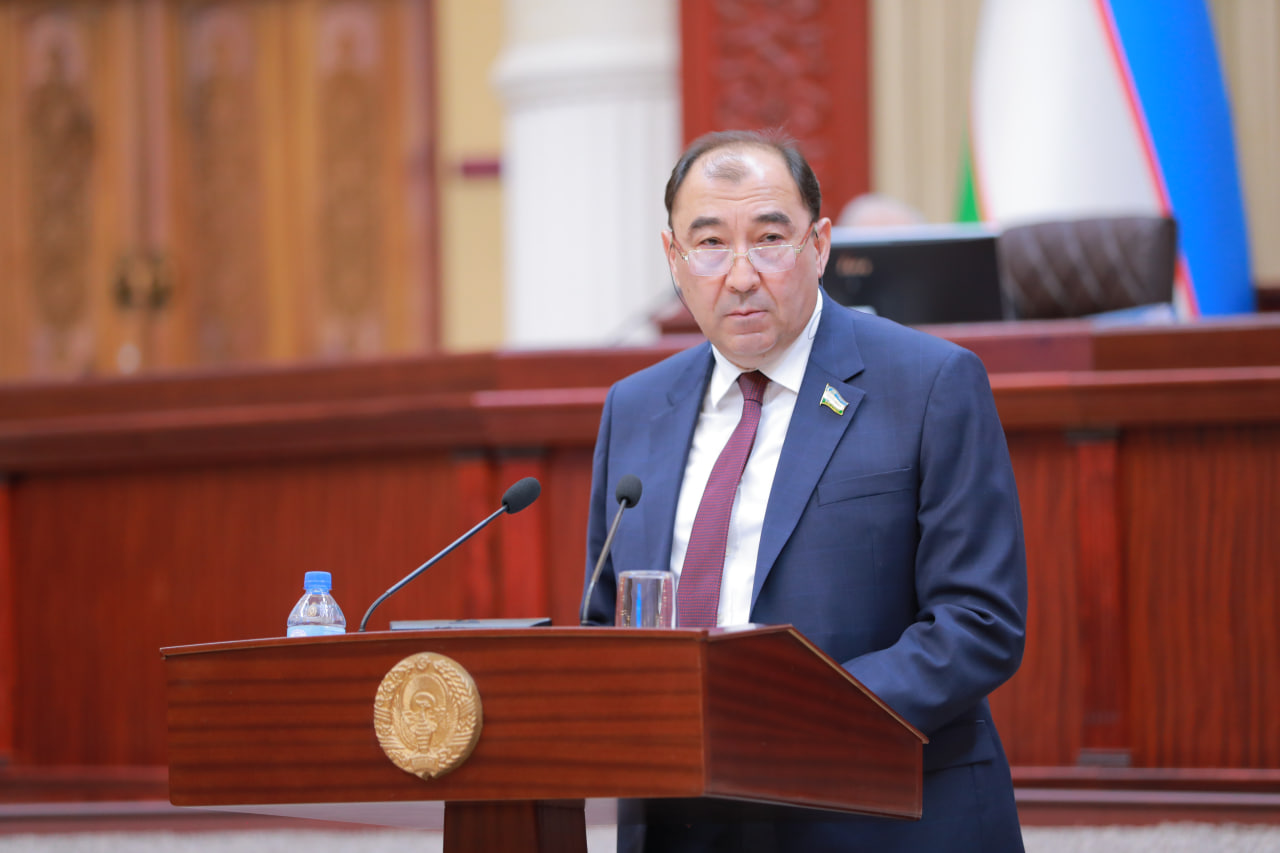Thus, Article 49 of the new edition of the Basic Law declares, among the basic civil rights, that the state is obliged to respect the basic environmental rights of citizens, prevent environmental degradation and abide by the principles of sustainable development. The focus on ensuring sustainable development can be seen in almost every norm of the Constitution and is suggestive of commitment to the global trend of forming the foundations for sustainable economic growth and environmental balance.
Uzbekistan, like most UN member nations, committed itself to the implementation of Sustainable Development Goals (SDGs) adopted at the General Assembly session in 2015.
Following that, the country has been steadfast in fulfilling the obligations undertaken. Thus, starting from 2015, a national system for the execution of SDGs has been underway. In 2018, national 16 goals and 125 tasks were approved, and a roadmap was devised for implementation to achieve the relevant national sustainable development goals for the period until 2030.
Successful implementation of national Sustainable Development Goals is impossible without open discussion with public involvement. The policy of openness and accessibility of statistical information pursued in our country was also implemented in the process of achieving the national Sustainable Development Goals through the launch in 2019 of a corresponding information portal, nsdg.stat.uz, by the Statistics Agency.
In order to constantly monitor the execution of national Sustainable Development Goals, at the early 2020, a Parliamentary Commission was set up to oversee the implementation of the tasks approved until 2030. By a corresponding joint decision of both chambers of parliament, a provision was adopted regulating the mandate and powers of the Parliamentary Commission in this area.
The government of Uzbekistan constantly demonstrates its commitment to its obligations defined by the national Sustainable Development Goals. A demonstration of this was the approval of the UN Cooperation Program for Sustainable Development of Uzbekistan for 2021-2025. In mid-2021, the first meeting of the coordination committee between the UN and Uzbekistan was held to implement the activities provided for in this Program.
The continuation of systemic steps to meet the national Sustainable Development Goals was the approval at the early 2022 of a government resolution on additional measures to implement the goals and objectives of Sustainable Development of Uzbekistan for the period until 2030. For the purpose of coordinated implementation of this decision, meetings of the coordination council are held on an ongoing basis.
One of the tools for communicating progress towards achieving the Sustainable Development Goals to the world community is the publication of Voluntary National Reports. Despite the optionality of this step, Uzbekistan has already published two National Reports on this issue. This once again shows the country’s strict commitment to fulfilling its international obligations.
Achieving national Sustainable Development Goals requires linking allocated funds from the state budget to the enactment of approved specific goals and objectives. Starting from 2021, the practice of monitoring the use of state budget funds has been introduced in the country, linked to the national Sustainable Development Goals. Thus, if about 69 percent of the state budget was spent on this in 2021, last year the figure exceeded 72 percent.
The practice of forming and using state budget funds shows the desire to achieve priority national Sustainable Development Goals. Analysis of the distribution of state budget funds indicates that 50 percent of the state budget was allocated to achieve the goals of reducing poverty, health and well-being, and quality education in 2023. This trend will continue in current year, and the share of expenses directly related to the implementation of obligations to achieve them will grow in both absolute and relative terms.
The development programs designed in Uzbekistan, as a main priority, should include the achievement of national Sustainable Development Goals and the implementation of specific approved tasks. In this regard, in the future, until 2030, in order to ensure the targeting of development programs and national Sustainable Development Goals, it is planned to allocate up to 84 percent of state budget funds to achieve 105 tasks. It should be noted that to date, the 5 national Sustainable Development Goals have been fully reflected in development programs.
The Program for the Transition to a Green Economy and Ensuring Green Growth in the Republic of Uzbekistan through to 2030, approved at late 2022, involves a conceptual change in the long-term development trend and the formation of inclusive economic growth built on the internationally recognized concept of green growth. For the period until 2030, specific indicators have been identified to reduce greenhouse gas emissions, boost the capacity of renewable energy sources, increase energy efficiency, reduce the energy intensity of the economy, ensure efficient water use, build green cities, develop forestry, cut the volume of household waste and upsurge the share of their effective recycling.
Uzbekistan has launched the process of issuing “green certificates”, and a modern monitoring system in the field of climate change is being introduced, as well as a new procedure for assessing the effectiveness of investment projects, aimed to ensure advanced and sustainable green growth. An important change in the philosophy of interaction with international institutions was the establishment of a coordination group of donors aimed at interaction and coordination of joint efforts to ensure long-term sustainable green growth in the context of global climate change.
Problem solving and search for optimal solutions to ensure sustainable green growth will be carried out on the basis of fundamental and applied research in priority areas in the field of green economy. Particular emphasis will be placed on the development and use of advanced green technologies available abroad in economic and household sectors, as well as encouragement of promising innovative developments and start-up projects.
It is inspiring that the concept of Environmental, Social and Corporate Governance (ESG) is being actively introduced into the national business practice, involving a departure from the traditional desire to obtain short-term financial outcome resulted from business performance. Instead a new paradigm for business development is being formed, in which the impact of entrepreneurial initiative on the future of nature and public interest is assessed.
During the transition to a green economy, the country will also have to raise awareness of the problems associated with climate change, measures to ensure an effective energy transition, and develop appropriate incentives and support measures to promote advanced technologies and business solutions. In this regard, in recent years, the infrastructure of “green” financing has actively shaped out and conditions for public-private partnerships have been created.
The ESG concept is becoming widespread in the banking sector when lending to various projects and assessing the client base for compliance with environmental standards and social responsibility of business. This process is also facilitated by international financial institutions, who have been imposing new, stricter requirements for potential local partners from an ESG perspective.
Along with the growing interest of the banking sector in implementing the ESG concept, the government is also taking a number of steps in this direction. Thus, Uzbekistan was the first in the Central Asian region to begin issuing government bonds in the amount of $870 million to finance nine priority national Sustainable Development Goals. In addition, Eurobonds worth $660 million were successfully placed and “green” sovereign Eurobonds worth UZS 4.25 trillion were listed on the London Stock Exchange. They became the first “green” sovereign bonds in the Commonwealth of Independent States.
An important element in ensuring conditions for sustainable green growth is effective international cooperation and interaction in this area. It is gratifying to note that Uzbekistan is actively developing bilateral cooperation with many interested parties. Examples include projects and initiatives carried out with the assistance of the United Nations Development Program (UNDP), the Asian Development Bank (ADB), the United Nations Food and Agriculture Organization (FAO), the French Development Agency (AFD) and many others.
A truly historic event of the past year was the Uzbekistan 2030 Strategy developed by the country’s leadership and approved for implementation. The content and focus of this strategic policy document clearly shows the direct connection and consonance of the set priorities and development goals of Uzbekistan with the national Sustainable Development Goals.
This document is based on the application of five key ideas put forward by President Shavkat Mirziyoyev in his electoral program. Among these ideas, the ones closest to the Sustainable Development Goals and the concept of “green” growth are the ideas of ensuring sustainable economic growth and delivering a comfortable ecological environment for the population. To successfully achieve the goals of the Uzbekistan 2030 Strategy, the President of the country signed a corresponding decree and a resolution, containing specific indicators and deadlines for their implementation.
The implementation of the Uzbekistan 2030 Strategy involves constant monitoring – together with the Coordination Council – of the execution of national goals and objectives in the field of sustainable development for the period until 2030. In this regard, a system of conducting, with the participation of the public, a systemic annual analysis of the enactment of Uzbekistan 2030 Strategy in accordance with the Sustainable Development Goals of the United Nations and publishing its results is being introduced into practice.
The modern practice of designing and implementing the Uzbekistan 2030 Strategy and the resulting development programs clearly indicates an integrated and systemic approach to improving priority areas of development and a qualitatively new stage in carrying out large-scale reforms in the country. The main ideas contained in the 2030 Strategy are a logical continuation of the practice of ensuring sustainable development, aimed at building a free and prosperous, strong New Uzbekistan.
Looking into the longer term, according to forecasts of leading national and foreign experts, the country will have a population of more than 50 million people by 2050. That means that the agenda for ensuring sustainable development and green growth will remain relevant in the future. Moreover, one should stress that addressing the problems of sustainable development in the context of global climate change will require additional and timely actions both at the national, but also at the regional and international levels.
In this regard, the recent initiatives of Uzbekistan’s President to jointly solve problems and challenges of regional and global scale are quite understandable and justified. This allows us to rightly conclude that we expect extensive and comprehensive joint actions to ensure “green” growth for long-term sustainable development in the public interests.

